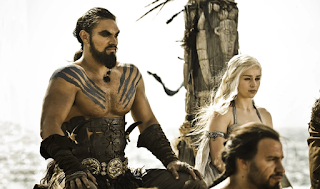Toxic Masculinity vs Healthy Masculinity in Fantasy
A lot of fantasy is based on reality, whether it is high fantasy or gritty fantasy. And unfortunately, with reality comes real issues, one of those issues being the misunderstanding and misuse of masculinity. This problem is especially something we see in today's society and some elements of toxic masculinity are even encouraged in our culture. Luckily, some recent figures have emerged to turn this issue around, but it still remains relevant in stories such as Game of Thrones. First, let's define what toxic masculinity, healthy masculinity, and masculinity in general really are. I'd say that masculinity is the natural attributes and characteristics that men possess due to our high levels of testosterone. That's pretty simple and easy. Next, I'd say that healthy masculinity is when men use these characteristics to protect the weak and innocent, build and create, and inspire others to do the same. Now, toxic masculinity is the opposite, and it is a trap that many men fall into. Toxic masculinity uses these manly characteristics to destroy and tear down, prey on the weak and innocent, and drag others into these destructive behaviors. This binary between toxic and healthy masculinity can clearly be seen in Game of Thrones. I don't think George RR Martin encourages behaviors of toxic masculinity, and I think he draws a strong line between the two in his novels, even if toxic masculinity is much more prevalent across Westeros. A good example of healthy masculinity in Game of Thrones is the character of Jon Snow. Jon is a strong man and a strong leader with a good heart. The world that Jon lives in cruel, merciless, and toxic, and is always trying to drag Jon down to its level, but throughout the story, Jon manages to keep his honor, his morality, and his life. Jon is loyal to family even though he isn't fully a part of the Starks. Jon treats his sisters with respect and love, he fights against injustice, and again and again chooses to do the right thing even though it puts his life at risk. For example, Jon knew that going to save the Wildlings from the White-Walkers and their Wights would anger his men, but he did it anyway because he knew that it was the right thing to do. Now this is an issue of morality, but I think that morality is directly tied to healthy masculinity. A man with a healthy understanding of what masculinity is would understand that he must use his manly attributes to do what is right, and doing what is right means protecting the innocent and building instead of destroying. Contrary to Jon Snow, pretty much every other man in Game of Thrones has a problem with toxic masculinity. Joffrey, Jaime, Ramsey, Stannis, the list goes on and on. Each of these characters uses their manly characteristics to hurt others, prey on innocent, defenseless people, and destroy for their own gain. They treat women with little respect, and glorify cruelty and murder. Now, almost every character in Game of Thrones is a mixed bag, so not every character is completely toxic or healthy. Each character has their own struggles and complexities, just like people do in real life. Every man struggles with toxic masculinity, and thats why the depiction of these things in fantasy such as Game of Thrones is so impactful. But what we need is for these stories to really show the faults of toxic masculinity and encourage men to reflect upon themselves and live with a healthy sense of what masculinity truly is and what it should be.


Comments
Post a Comment